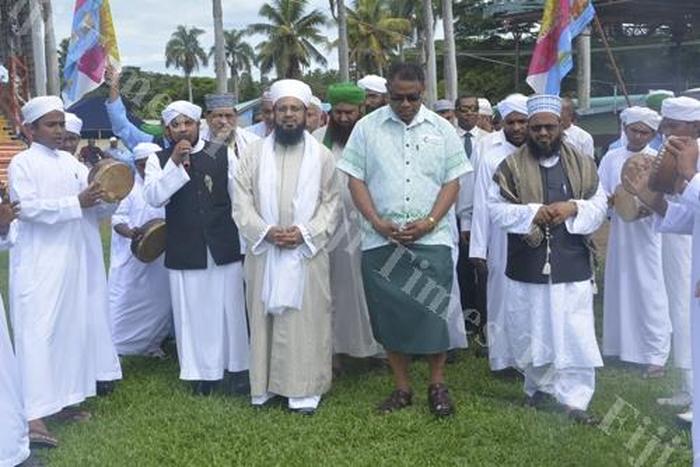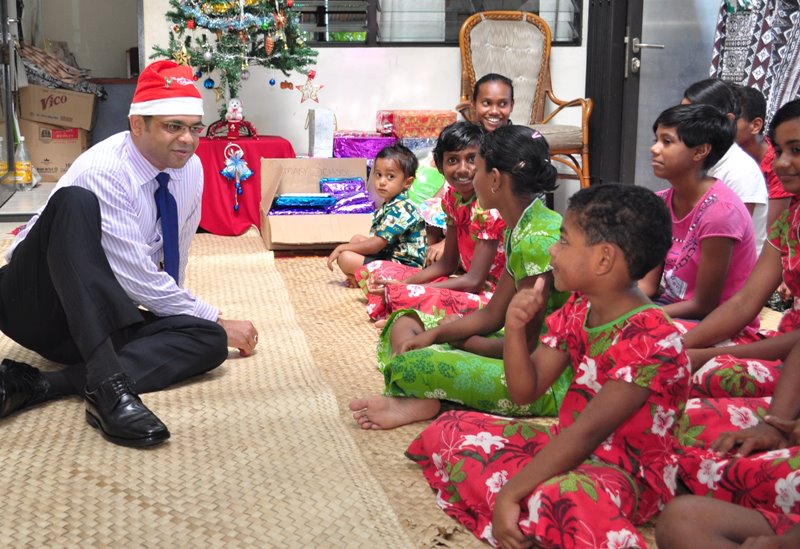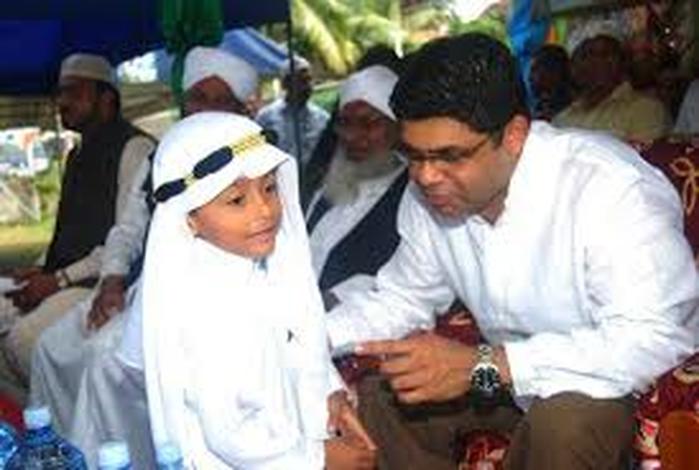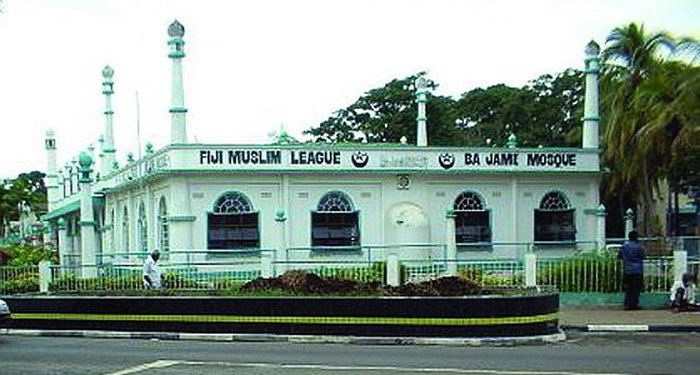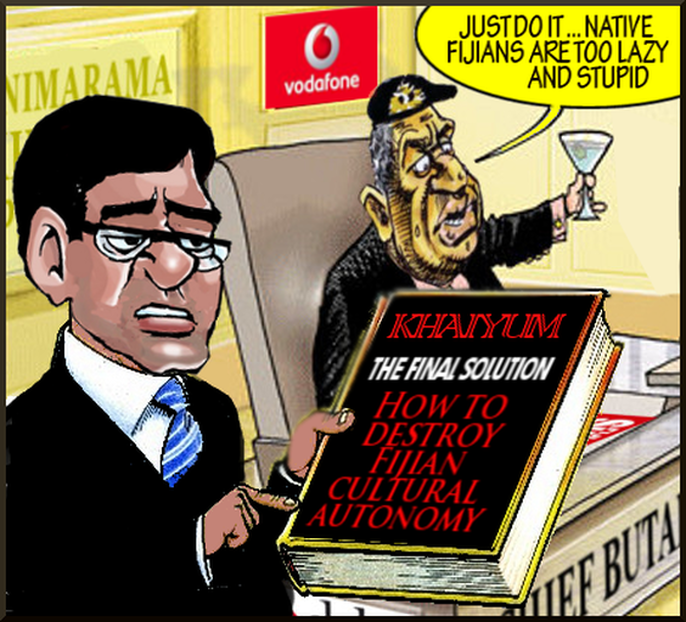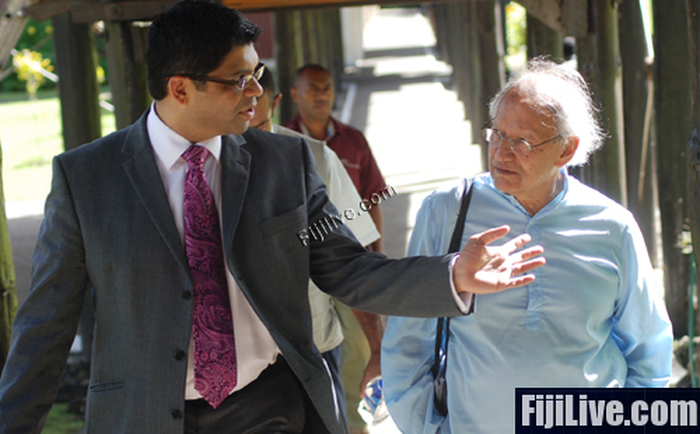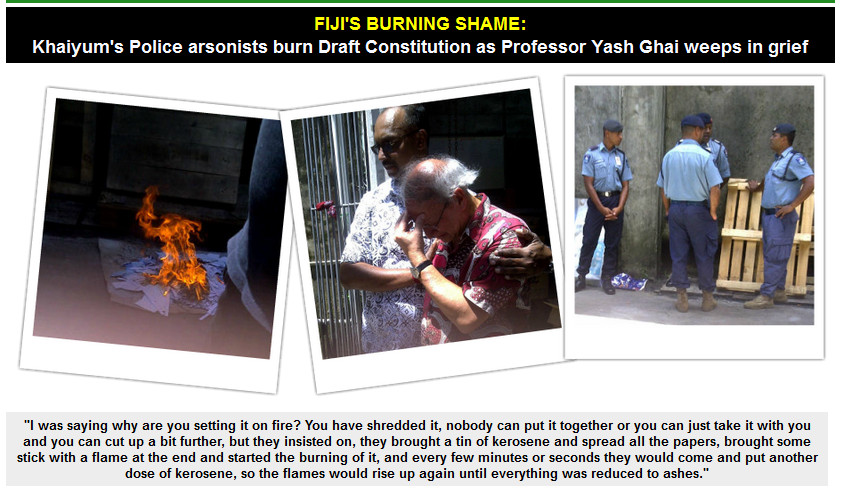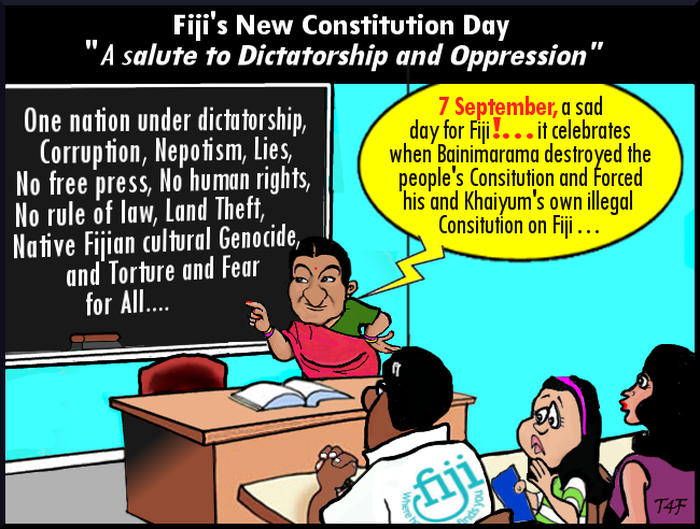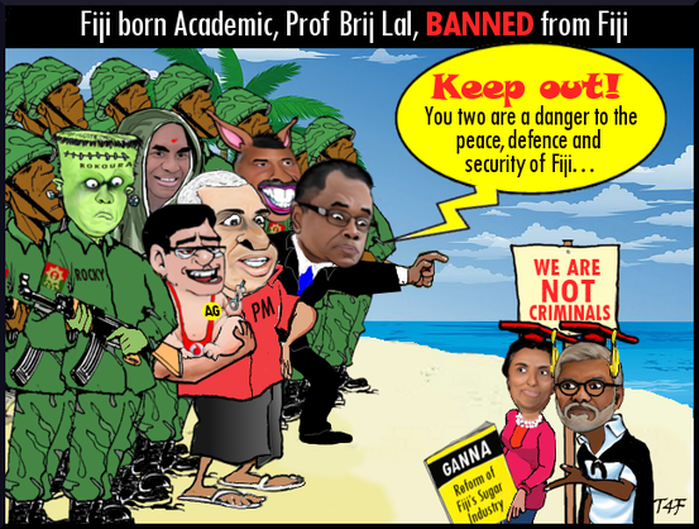Believers of the Muslim faith took the day to reflect on the life of Prophet Mohammad.
Joining the celebration was Minister for Immigration, National Security and Defence Timoci Natuva, who honoured Muslims across the country for their contribution to the development of the country.
"It is very reassuring to witness with the presence of so many and the trust, faith and spirit of togetherness that we have fostered among us," he said.
"Without any doubt, I know that the teachings of Prophet Mohammad that include a quest and desire for peace, tolerance, understanding, harmony and unity are living among us.
"The Government, on behalf of the people of Fiji, acknowledges the unceasing contributions of the Muslim community in Fiji to the development of the nation.
"The Muslim community has made its mark in various fields that include education, commerce, religion, politics and agriculture and representation in Government."
He said despite rising global challenges, it was important that different communities worked together. Source: Fiji Times
Aiyaz Sayed Khaiyum on Fiji Muslim League - has the League reformed?
"Most Muslims in Fiji know that certain officials treat the League and its branches as their own little fiefdoms. Fiefdoms, where nepotism is known to be rampant at most times; where certain families and individuals have reigned as executives literally for decades; where children and families of well-to-do officials benefit from scholarships which were and are meant for poor students; where chairs of numerous committees are held by single individuals; where businessmen and business interests are over represented; where women, the youth, various provinces and other denominations are either underrepresented or not represented at all; where appeals to religious dogma and unity are utilized in response to queries of administrative/financial discrepancies and where certain individuals view the League merely as a means to acquire access to power, influence and ultimately money -
all under the guise of "protecting Muslim interests."
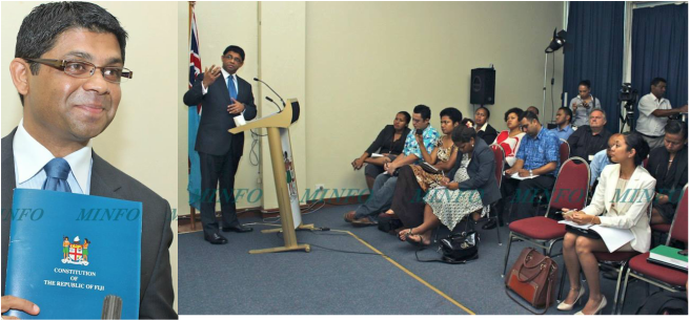 Thirteen years later - imposes his own 2013 Constitution on Fiji and the highly skewed D'Hondt electoral system, with the help of traitorous hand-picked election commissioners, including Professor Vijay Naidu of USP
Thirteen years later - imposes his own 2013 Constitution on Fiji and the highly skewed D'Hondt electoral system, with the help of traitorous hand-picked election commissioners, including Professor Vijay Naidu of USP (Letter from A S Khaiyum)
The claim by some executive members of the Fiji Muslim League ('League') that Muslims support a review of our [1997] Constitution and demand separate seats merely because the executive says so is a gross misrepresentation of the views of the everyday and majority of Muslims in our country. The executive lack the mandate to speak as a representative body for Muslims since the League has been and is essentially an administrative institution managing and maintaining mosques, schools, orphanages, a sugar cane farm and real estate. In addition to the lack of mandate the arguments and justifications espoused by the executive for a review and separate seats are flawed.
They are flawed because our Constitution, in particular the Bill of Rights, namely sections 38(2) and 35 more than adequately guarantee and protect religious freedom and minority rights. Indeed if an almost identical South African Bill of Rights provision protects the rights of the minority South African Muslims then what is so special about and differentiates Muslims in Fiji? On the basis that last century the then nascent League made submissions on separate seats, it is argued today that so called Muslim rights will be achieved if these seats as submitted then are allocated now. To refer to a resolution passed some seventy years ago, in an era with its own specificities and dynamics, as justification for separate seats in today's Fiji illustrates a complete ignorance and denial of our political, social and constitutional history/experience as a nation-state. Indeed if we were to hark back and uphold the standards of 1929 then commoner indigenous Fijians and women would not have the right to vote. Fiji and the rest of the world have moved along.
Clearly such absurd referrals to the past illustrate an enormous vacuum in basic critical thinking and analysis, discourse and a general prevalence of obscurantism within the executive. Furthermore, it aptly demonstrates a complete ignorance of contemporary developments in and interpretations of Islamic law and jurisprudence vis-a-vis constitutional, human rights and international law and conventions. More tragically, however, the opportunism of the executive displays the absence of and lack of belief in justice, compassion, selflessness and basic human decency. Most Muslims in Fiji know that certain officials treat the League and its branches as their own little fiefdoms.
Fiefdoms, where nepotism is known to be rampant at most times; where certain families and individuals have reigned as executives literally for decades; where children and families of well-to-do officials benefit from scholarships which were and are meant for poor students; where chairs of numerous committees are held by single individuals; where businessmen and business interests are over represented; where women, the youth, various provinces and other denominations are either underrepresented or not represented at all; where appeals to religious dogma and unity are utilized in response to queries of administrative/financial discrepancies and where certain individuals view the League merely as a means to acquire access to power, influence and ultimately money - all under the guise of "protecting Muslim interests."
Indeed the absence of proper representation, transparency, accountability and ultimately legitimacy also plague other local institutions in contemporary Fiji. The executive of the League cannot and does not represent the political opinion, views, philosophies of individuals or the bulk of Muslims in Fiji. These self appointed guardians do not speak for the masses. Therefore, the current administration and all Fiji Islanders must understand and recognize the majority of Muslims who believe in basic human decency, justice, democracy and constitutionalism reject the idea of separate seats and/or a review of our 1997 Constitution.
Aiyaz Sayed-Khaiyum
University of Hong Kong
Hong Kong
[email protected]
August 2000

(Edited article in The Fiji Times, 12 Dec. 2015)
By Wadan Narsey
I have previously refrained from writing about the Bainimarama Government’s banning from Fiji of Dr Padma Lal (wife of Professor Brij Lal) from Fiji, because she is my sister and it would be perceived as a “conflict of interest”.
But more and more, senior executives in government and public enterprises suddenly resign, allegedly “for personal reasons” which often means, given that they are at the height of their experience and ability, that they were being pushed out.
Or they are just brutally given their marching orders, resisted with futility sometimes, just as some executives at a major media company were, and to rub salt into the wound, their marching orders are often given by expatriates of dubious merit, appointed to high positions by the Bainimarama Government.
If they are lucky, they are put out to pasture in sinecure appointments here and there or in embassies overseas.
Prominent newspaper publishers have been deported for doing their jobs professionally and ethically.
You can draw up your own list of such persons.
What is shocking however, is that there has been no public outcry at possibly unfair terminations of contracts.
It might be too much to expect individuals to protest publicly. They may feel too exposed (it is hard enough for them to criticize the government privately to me, as they look over their shoulders to check who might hear).
But one does expect organizations associated with the “dis-employed” person to publicly register their protest if there is any possibility of an unfair dismissal decision.
But that does not happen either, just as it did not when Dr Padma Lal (and Dr Brij Lal) were banned from entering Fiji.
I shall only write about the failure of institutional responses, and only with respect to Dr Padma Lal, about whom the Bainimarama Government said not a word, and whose only “crime” seems to be that she is married to Brij Lal.
Who is Padma?
She is a Gujarati girl from Toorak, one of the first science graduates and indeed gold medalist from USP, who later taught at USP.
She did pioneering work in marine biology, and a pioneering PhD in environmental economics in relation to Fiji’s marine environment and the interface with commercial agriculture.
She became an expert in the sugar industry, with her book Ganna (“sugar cane” in Hindi) bringing together a collection of articles analyzing most problem areas in the sugar cane and milling industries, including detailed analysis of the productivity (or rather the lack of it) in the cane farms and sugar mills.
She has worked for, and developed solid reputations with international scientific research organizations like ABARE, IUCN and CSIRO.
She was deemed good enough in 2008 to be the Chief Guest at USP’s medal awards ceremony, conducted under the current Vice-Chancellor.
She also recently applied for a professorial position at USP in her field, and was denied an appointment for unstated reasons, despite being a regional person eminently qualified for that position.
She and her husband bought a house in Suva, intending to spend more time and work in Fiji and the Pacific.
Unlike her abrasive, undiplomatic and politically incorrect older brother, she networked widely and contributed in many fields.
She served on the Gujarat Education Society Board; participated in the events of the Rajput Society (the dhobis) of which she and I are part; she was a Rotarian; and goodness knows what else she threw her abundant energy at.
She was an ideal peaceful decent law-abiding citizen and resident of Fiji, far more than the myriads of foreigners who have been welcomed in Fiji by the Bainimarama Government.
Yet Dr Padma Lal has been banned from entering Fiji, for no other reason than that she was married to Professor Brij Lal.
This academic, armed only with her laptop and spreadsheets analyzing the productivity of the sugar industry or the economic value of some marine environment, was deemed by the Minister for Home Affairs and former RFMF officer Timoci Natuva, to be dangerous for the security of Fiji.
Questions were asked in parliament, with totally unconvincing answers being given as the cause for the banning, other than that it was a “collective” decision coming from the Prime Minister’s Office, they had the “right” to make the decision, and the decision was final.
How utterly ridiculous.
There is no comparison to be made between Dr Padma Lal’s talents and contributions to Fiji, with those of the individuals who made the decision to ban her.
So why have the institutions been silent?
The quiet institutions
The management of the University of the South Pacific, of which Dr Padma Lal is undoubtedly one of the luminaries, both as a student and academic, said not a word in protest, and neither did the Staff Association.
Neither did any of the other Fiji universities utter a word of protest.
The Fiji Association of Women Graduates said not a word.
The sugar industry organizations who all stood to benefit from Padma’s work said not a word.
The IUCN, Padma’s employer, said nothing publicly.
The Fiji Women’s Rights Movement and the Women’s Crisis Centre, both led by CEOs who were both junior to Dr Padma Lal and know her extremely well, both professionally and socially, said not a word.
The Gujarat Education Society and the Rajput Society said not a word in protest.
The Hindu religious organizations (yes, Padma was a practicing Hindu) the Arya Samaj and the Sanatan Dharam said not a word, and neither did any of the Christian religious organizations.
The CCF said nothing.
The Rotary Club said nothing.
The Law Society, perhaps not concerned about what happens to foreigners even if they are distinguished former citizens making great contributions to the country of their birth, said nothing. But neither are they particularly concerned about the lack of justice for their own fellow citizens.
A massive number of former academic colleagues of Padma Lal, many of whom appear often in Fiji and in the media extolling the virtues of the Bainimarama Government, said nothing publicly. They also include a very prominent current Minister in the Bainimarama Government (Dr Mahendra Reddy) who worked closely with Padma in researching the sugar industry.
What is going on?
Not lack of ethics or morals
It would be too easy and wrong to accuse all the individuals who are heads of these organizations of personal cowardice or lack of morals and ethical principles.
I know that most (not all) of the individuals concerned are upright law-abiding moral citizens.
Should any friend or relative suffer a death in the family, they will be there to share grief, just as they gladly share the joy at births and weddings.
So how explain the institutional silence at the injustice against Dr Padma Lal, which is so blatant and clear-cut that not even the Government propaganda outlets have supported her banning.
Even a prominent academic arduously pro-Bainimarama blogger in NZ (Professor Croz Walsh) expressed dismay that the Fiji government was spurning the enormous potential contributions of Dr Padma Lal (and Professor Brij Lal) to Fiji.
How explain that collectively, the institutions they lead, have demonstrated for the last nine years, a horrible silence in the face of so many injustices to individuals in government and public enterprises.
One can only conclude that despite the election of a parliament, there continues a culture of intimidation, fear and silence, even when individuals in our society are blatantly denied their basic human rights, including the right to visit Fiji, or even the right to life.
This does not bode well for Fiji’s future.
Pastor Martin Niemöller, a victim of Hitler’s Nazi Germany, once wrote:
First they came for the Socialists, and I did not speak out--
Because I was not a Socialist.
Then they came for the Trade Unionists, and I did not speak out--
Because I was not a Trade Unionist.
Then they came for the Jews, and I did not speak out--
Because I was not a Jew.
Then they came for me—and there was no one left to speak for me.
